Launching the #CPUOverload Project: Testing Every x86 Desktop Processor since 2010
by Dr. Ian Cutress on July 20, 2020 1:30 PM ESTGaming Tests: GTA 5
The highly anticipated iteration of the Grand Theft Auto franchise hit the shelves on April 14th 2015, with both AMD and NVIDIA to help optimize the title. At this point GTA V is super old, but still super useful as a benchmark – it is a complicated test with many features that modern titles today still struggle with. With rumors of a GTA 6 on the horizon, I hope Rockstar make that benchmark as easy to use as this one is.
GTA doesn’t provide graphical presets, but opens up the options to users and extends the boundaries by pushing even the hardest systems to the limit using Rockstar’s Advanced Game Engine under DirectX 11. Whether the user is flying high in the mountains with long draw distances or dealing with assorted trash in the city, when cranked up to maximum it creates stunning visuals but hard work for both the CPU and the GPU.
We are using the following settings:
- 720p Low
- 1440p Low
- 4K Low
- 1080p Max
For our test we have scripted a version of the in-game benchmark. The in-game benchmark consists of five scenarios: four short panning shots with varying lighting and weather effects, and a fifth action sequence that lasts around 90 seconds. We use only the final part of the benchmark, which combines a flight scene in a jet followed by an inner city drive-by through several intersections followed by ramming a tanker that explodes, causing other cars to explode as well. This is a mix of distance rendering followed by a detailed near-rendering action sequence, and the title thankfully spits out frame time data. The benchmark can also be called from the command line, making it very easy to use.
There is one funny caveat with GTA. If the CPU is too slow, or has too few cores, the benchmark loads, but it doesn’t have enough time to put items in the correct position. As a result, for example when running our single core Sandy Bridge system, the jet ends up stuck at the middle of an intersection causing a traffic jam. Unfortunately this means the benchmark never ends, but still amusing.
| AnandTech | IGP | Low | Medium | High |
| Average FPS |  |
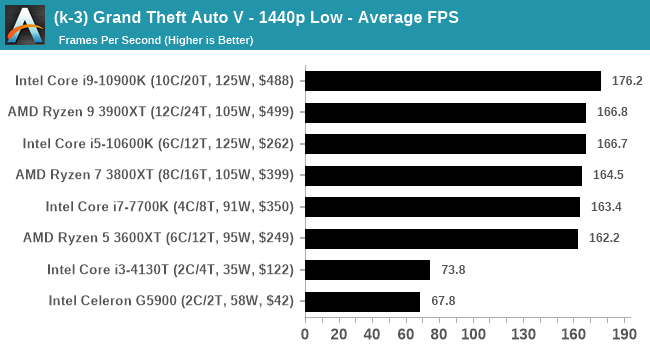 |
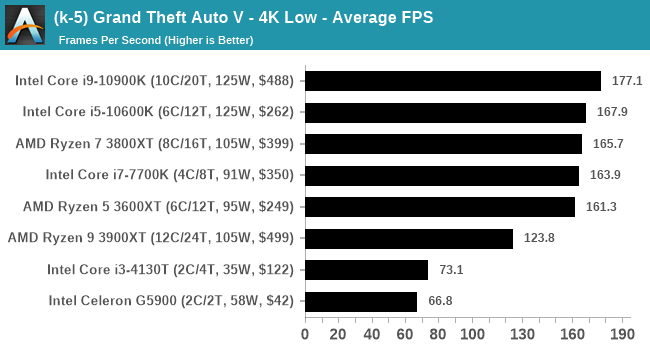 |
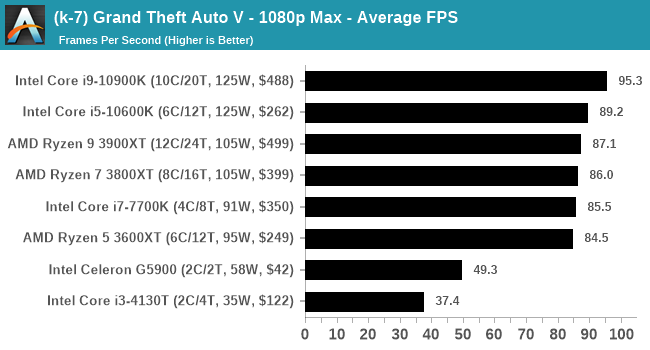 |
| 95th Percentile | 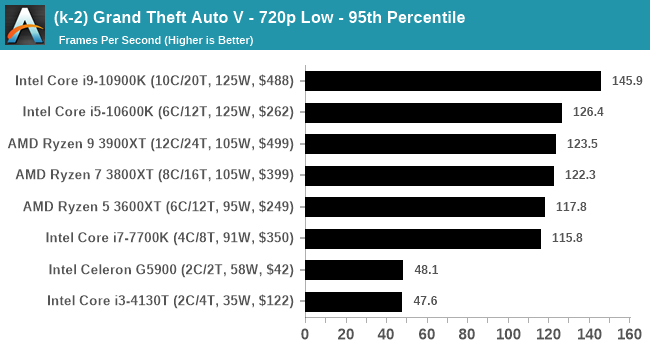 |
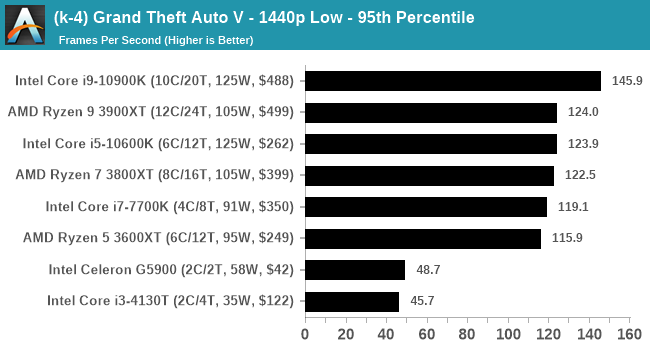 |
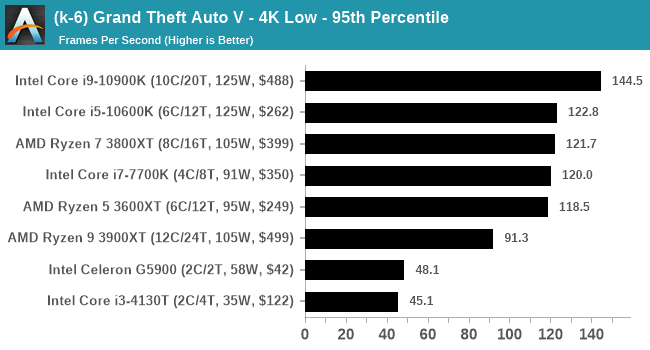 |
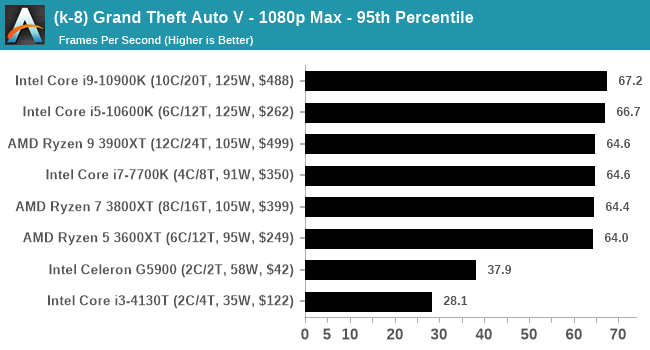 |
All of our benchmark results can also be found in our benchmark engine, Bench.












110 Comments
View All Comments
PeachNCream - Tuesday, July 21, 2020 - link
You don't get what it means to perform a controlled test do you?Aspernari - Wednesday, July 22, 2020 - link
It's important to note that the environment is not actually well-controlled.https://twitter.com/IanCutress/status/128480609693...
We don't know temperature for the operating conditions for these tests, which matters more and more for boost behavior for CPUs and GPUs. He says 36c when he got into the office, we'll never know what the temperature peaked at, nor how often similar conditions were reached.
A standard platform is a good choice, but a controlled environment is also important. Unfortunately, the results aren't as reliable as they otherwise might have been.
PeterCollier - Wednesday, July 22, 2020 - link
And that's why this entire test is a complete waste of time. Something like Geekbench or especially Userbench is much, much better because it gives you a range of scores. Instead of trying to create false precision by saying that a AMD 4700U scored, say, a "979" on a benchmark, Userbench will say that all the 4700U's tested scored from 899 to 1008, and break it down into percentiles. This way, you have a range of expected performance in mind instead of being fixated on that "979" number, which could have been obtained in an unrealistic scenario.Rudde - Saturday, July 25, 2020 - link
Isn't userbench a synthetic together with geekbench? What exactly are they testing? Instead of knowing which of Intel i7 10700k and AMD ryzen 7 3800X is better at rendering, video encoding, number crunching or whatever your use case is, you'll get a distribution based on a largely unknown test. The Intel and AMD processors might end up being within error margins of each other in your use case, but that in itself tells something too. All benchmarks are inherently bad; there is not a single benchmark that captures every use case while not being affected by its environment (ram speeds, temperatures, etc). I prefer tests that I understand, over tests that I do not understand.bananaforscale - Wednesday, July 22, 2020 - link
One could ask what the point of Userbenchmark is in these days of quadcores being basically entry level while the benchmark has DECREASED its multicore weighting.A5 - Monday, July 20, 2020 - link
For my own personal test, getting an i7-4770K in the list would be a big help.Once you have a compile test, a Xeon E5-1680v3 would be nice to see so that I can sell my corp on newer workstations...
Shmee - Wednesday, July 22, 2020 - link
Those are great Haswell EP CPUs, and they OC too! I have an E5-1660v3 in my X99 rig.Mockingtruth - Monday, July 20, 2020 - link
I have a 3570k and a E8600 spare with respective motherboards and ram if useful?CampGareth - Monday, July 20, 2020 - link
Personally I'd like to see a Xeon E5-2670 v1 benchmarked. I'm still running a pair of them as my workstation but these days AMD can beat the performance on a single socket and halve the power consumption.Samus - Tuesday, July 21, 2020 - link
Do you run them in an HP Z620? I ran the same system with the same CPU’s for years at one of my clients. What a beast.